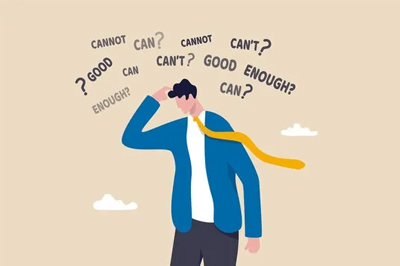 Accustomed to earning high grades in high school, I ended up with a 2.3 cumulative GPA at the end of my freshman year in college. Earned a D+ in a reading and composition class and an Incomplete in introductory Computer Science – a total shock to me. My class was full of former valedictorians – I didn’t even know what a valedictorian was because my high school didn’t award them. I wondered, “Am I not cut out for this?” Even thought about transferring to another institution.
Accustomed to earning high grades in high school, I ended up with a 2.3 cumulative GPA at the end of my freshman year in college. Earned a D+ in a reading and composition class and an Incomplete in introductory Computer Science – a total shock to me. My class was full of former valedictorians – I didn’t even know what a valedictorian was because my high school didn’t award them. I wondered, “Am I not cut out for this?” Even thought about transferring to another institution.
Welcome to Imposter Syndrome. It is a feeling of self-doubt about one’s abilities despite accomplishments and credentials. One fears being “exposed as a fraud” and may feel they don’t belong in a place, whether in an academic institution or workplace.
Imposter syndrome can affect anyone of any background, but it is particularly prevalent among those who are different from most of their peers. In a university setting, students of color, 1st generation college students, and women in male-dominated fields. more often report feelings of imposter syndrome.
Many who experience imposter syndrome are high achievers who were in families which held high standards for achievement and success. They may be perfectionists who might associate their self-worth based on their accomplishments.
Consequences
Individuals feeling like imposters are less likely to speak up or ask questions in class (or the workplace) because they’re afraid they’ll appear foolish or found out as “fakes” or “frauds.” This can be detrimental to learning outcomes in the long run, and thus spiral into a self-fulfilling prophecy of lower performance. Over time, this can lead to experiencing low-self esteem, anxiety and depression.
What to do
There are many ways to help yourself. Some of these include:
Positive self-affirmation. You can recite mantras to yourself such as:
“I am worthy, I am capable, and I can do the job.” “I am learning, and I will get through this.”
Note and celebrate any accomplishment. This is effective particularly when you break down a large project or assignment into small, easily achievable tasks – check them off and recognize that when you’ve completed them. Give yourself a pat on the back!
Stop comparing yourself to others. While it can be useful to motivate yourself towards continual self-improvement, constant comparison may also lead to jealousy, frustration, and misery, with no end in sight. Instead, recognize that others are in different paths of their life, and you may not know of their own struggles. Focus on your own strengths and set goals aligned to your advantages.
Find your people. This can be an affinity group – such as those with an ethnic, cultural, or religious affiliation, or an academic or professional group (e.g. women in engineering) – it’s helpful to be with those with commonalities. At the same time, you can also reciprocate and offer support to others who may be trying to find their way and need a boost, too.
Get Assistance. For academic needs/advice – talk to your academic advisor, department. Find a study group or a study buddy, or even tutoring when you need it. For mental health matters, don’t be afraid to seek professional help, such as counseling or therapy, when appropriate.
How did I get out of my academic hole as a college student? Knowing of other students who struggled academically, I recognized that I wasn’t alone. In response, I focused on retaking the classes I didn’t pass, and switched to a major that was a better fit, taking classes that I really enjoyed. Not only did I manage to graduate in 4 years (which was not always a given), but even went on to graduate school. If I did it, so can you.




